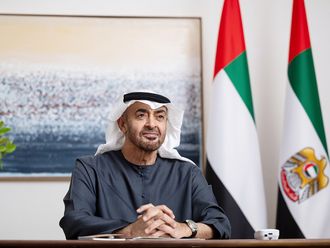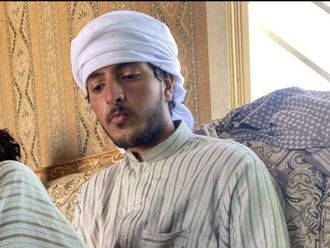Dubai: Augmented reality, facial recognition software, video analysis and devices to track and disable disrupting drones are some of the technologies being tested by Dubai Police for future use, officials said on Wednesday.
These technologies, some of which are in collaboration with Huawei, were on display at Dubai Police’s Gitex stand.
These are part of an agreement with Huawei to work together on establishing the Dubai Police’s Safe City Innovation Centre and create a platform for knowledge exchange.
Lt Gen Khamis Mattar Al Mazeina, Dubai Police Chief, and David Wang, CEO at Huawei Technologies–UAE, signed the three-year extendable agreement on Wednesday at Gitex.
“This centre will be a hub for innovation and new projects that involves futuristic technology. For example, we will focus on technologies like facial recognition and behaviour recognition, and we will focus on the Internet of Things, which is one of the newest technologies, as well as big data,” Brigadier Kamel Butti Al Suwaidi, director of the Operations Department of Dubai Police, said following the signing.
One of the main goals of the centre, he said, is knowledge exchange between Huawei and Dubai Police. “The second objective is to carry out research and development with Huawei, to come out with creative innovations in this field.
The centre will also be a permanent platform to showcase and test new products and innovation related to safe cities, he explained, so they can be applied to police work in the city.
Huawei displayed some of their latest technologies and innovations that can contribute to keeping cities secure and safe at the Dubai Police Gitex stand, including their augmented reality-based policing, intelligent facial recognition and intelligent video analysis.
“Many of the technologies on display are either already in use or are in the testing phase to see if they can be applied. The facial recognition system, for example, is being tested by us to see what we can use it for. The video analysis allows us to find something specific in a video. For example, you want footage that has a red car; the software will search the footage and give you the results fast, instead of someone watching hours and hours of video,” Brig Al Suwaidi said.
The augmented reality policing system is also being tested to find relevant applications for it by Dubai Police’s Smart Services.
Frank Dai, director of the Public Safety Vertical of the UAE enterprise business group at Huawei, explained to Gulf News how the augmented reality system works.
“It is similar to the technology used by the game Pokemon Go. It has four modes, building, facial recognition, facilities and vehicle,” he said.
The programme can be used on a mobile phone, and it uses the phone’s camera as a means of input. “The officer chooses one of the modes, for example, the building mode and when he points the camera at buildings in the area, the screen shows you all the information available on the building, for example, who is the owner, how many rooms, etc,” Dai said.
This works by taking the data collected through the camera and comparing it to the information available in the database, and showing it on the screen instantly.
“If the vehicle mode is chosen, then the vehicle’s make, owner and registration details will be displayed instantly. It is the same with the facilities option, but this time it will show you information about the infrastructure systems such as power or water lines in the area,” he said.
As for the intelligent facial recognition solution, Dai said the software is used with any CCTV camera, and allows the user to track the movement of a certain person, through facial recognition, through the live footage.
“It shows exactly where the person has been at what time, and can also show this information in the form of a map,” he said.
Another technology being considered is a disabling device shaped like a gun that uses radar technology to locate unauthorised drones used for personal or commercial use that are causing disruptions, and disable them by emitting electronic waves.
Dubai Police’s Safe City Innovation Centre building’s location has not been finalised yet, Brig Al Suwaidi said, but construction is expected to start at the beginning of 2017.
“We are currently working on developing the concept and idea and, hopefully, by next year we will start the execution,” he said.












